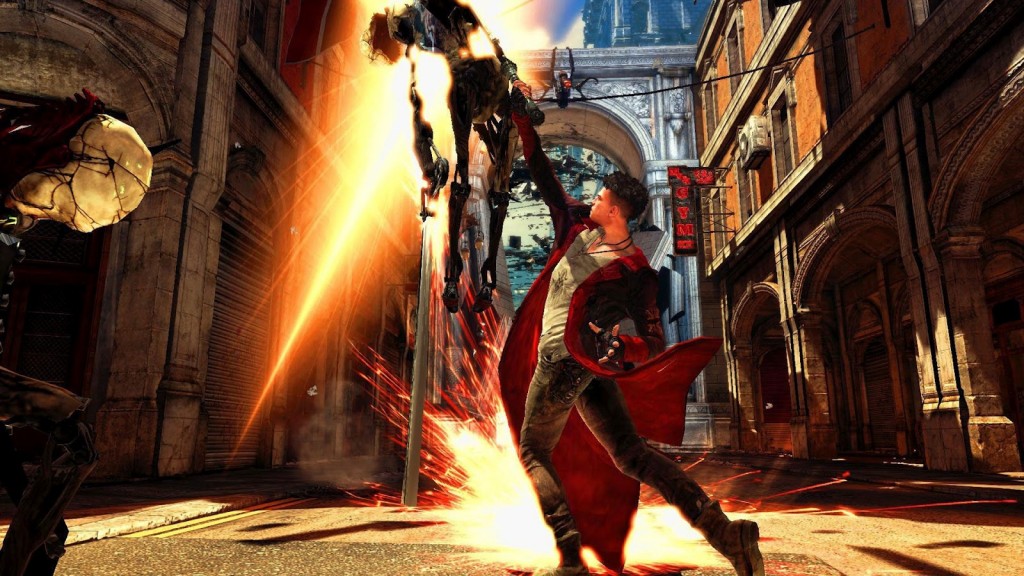Culture
Bit Slap: Demons, man. Demons.

Every Wednesday in Bit Slap, Joe Anderson offers up the latest in gaming news and bon mots.
I finished Devil May Cry over the weekend. All told, I dug it. I didn’t feel the need to go back and scour past levels for secrets, so the whole experience took me about 10 hours. As I wrote last time, a game that doesn’t promise to last a gorillian hours is actually pretty refreshing.
I will concede that aspects of the game felt a lot closer to Dante’s Inferno (EA’s unrelated 2010 God of War clone) than it did to previous entries in the DMC series. Much like Dante’s Inferno, DmC puts a lot of emphasis on the duality of angelic and demonic weapons—although in DI it was holy and unholy—but my issue is that the angel weapons weren’t nearly as satisfying to use. A blessed scythe or divine ninja stars sound pretty awesome on paper, but if you give me giant molten fists, I’m going to do everything I can to turn this game into Will Wright’s Lavamancy Pugilist Tycoon.
Even if DmC were a more flawed game, I’d still eat that shit up. Why? Because you kill demons. And demons are assholes. For all intents and purposes, demons are mythical Nazis. If you need a bad guy that audiences won’t be tempted to empathize with and Nazis are off the table—maybe you’re not a fan of creative anachronisms—just make him or her a demon.
At the same time, demons are ultimately unfulfilling when it comes to plot specifics, as the limits of demonic power are so rarely specified. This is something that has always bothered me when demons are used in basically any entertainment medium. Usually the narrative will specify that the demon’s only weakness is holy water/an orphaned child’s laughter/bullets made from the pope’s bones, but it will do nothing to even ballpark the internal logic in a demon’s powers. Honestly, I think Fallen was the only time I had a handle on exactly what a demon antagonist was capable of.
So often it boils down to a more eloquent version of “Hey man, expect some freaky stuff when you fight that demon. I don’t think he’s ever transformed into a dragon with your sister’s face, but if that happens, don’t be surprised. Because he’s a demon.”
There’s a boss fight in DmC where you fight the demon king’s mistress, who is carrying his unborn demon spawn—as demon mistresses are wont to do. At the start of the encounter, she merges with her baby spawn and transforms into a weird monster fetus thing that’s gross as hell that motivated me to finish the fight as fast as humanly possible so I didn’t have to look at it anymore. After the fight, she is forced back into her “normal” human form and killed by (presumably) regular bullets in a hostage situation gone wrong.
Why did bullets kill her? Why can’t she regenerate like other demons? Is it because she was weakened from a fight? How long before her weird fetus transformation powers are recharged? Is she actually a weak demon that just has a super strong fetus? Do demons dream of sulphuric sheep?
There are the types of questions we don’t expect to be answered but, at the same time, start to make the power struggle in the narrative fuzzy if they keep popping into our heads. Maybe Dante, as a half demon himself, is so strong that he whooped her into a killable state. Howver, quickly escalating supernatural powers can be a slippery slope, because we start to run out of depictions of strength and skill and they begin to become abstract. Think about the end of Dragon Ball Z, when even the weakest characters, still capable of blowing up planets, are useless.
I’m definitely not looking for the hard sci-fi equivalent of demonology, either. Demons need vagueness because it wraps them in mythical shroud which makes a protagonist’s triumph over them that much more exhilarating. It’s just that the Lovecraftian tradition of evil forces we can’t wrap our minds around sort of breaks down when we start killing those very same forces with regular goddamn bullets.